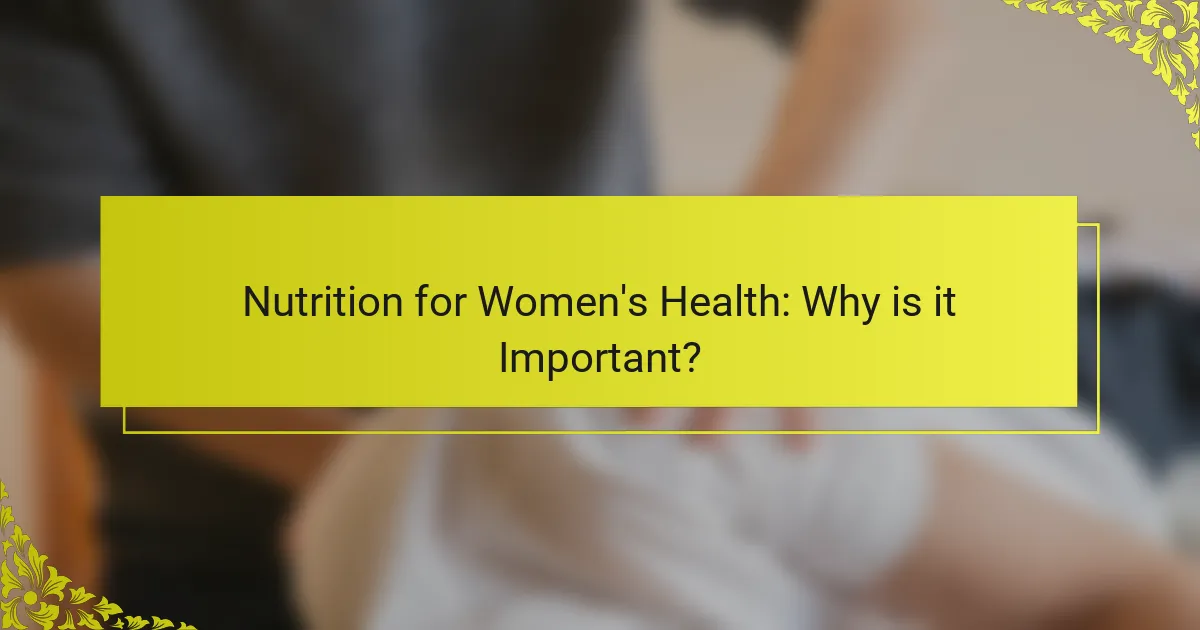Nutrition is essential for women’s health, impacting hormonal balance, energy levels, and weight management. Key nutrients like omega-3 fatty acids, calcium, and iron support these aspects. A balanced diet rich in whole foods enhances overall well-being and stabilizes blood sugar levels. Additionally, hydration and specific dietary strategies can further promote hormonal health and sustained energy.

Nutrition for Women’s Health: Why is it Important?
Nutrition is crucial for women’s health as it supports hormonal balance, boosts energy, and aids weight management. Proper nutrition helps regulate menstrual cycles and alleviate symptoms of PMS. Nutrients like omega-3 fatty acids, calcium, and iron play significant roles in overall well-being. Women should prioritise a balanced diet rich in fruits, vegetables, whole grains, and lean proteins to maintain optimal health. As a result, effective nutrition can enhance mood, reduce fatigue, and promote a healthy weight.
How Does Nutrition Affect Hormonal Balance?
Nutrition significantly influences hormonal balance by providing essential nutrients that regulate hormone production and metabolism. A balanced diet rich in whole foods, healthy fats, and lean proteins supports optimal hormonal function. For example, omega-3 fatty acids, found in fish and flaxseeds, can reduce inflammation and promote hormonal health. Additionally, maintaining stable blood sugar levels through complex carbohydrates helps prevent hormonal fluctuations. Incorporating fibre-rich foods aids in the elimination of excess hormones, further supporting balance. Prioritising nutrient-dense meals can enhance energy levels and assist in weight management, crucial for overall women’s health.
What Role Does Nutrition Play in Energy Levels?
Nutrition significantly influences energy levels by providing essential nutrients that fuel bodily functions. A balanced diet rich in whole foods enhances hormonal balance, which is crucial for sustained energy. For instance, complex carbohydrates, healthy fats, and proteins contribute to stable blood sugar levels, preventing energy crashes. Additionally, micronutrients like iron and B vitamins play unique roles in energy metabolism. As a result, prioritising nutrient-dense foods can lead to improved vitality and overall health for women.
How Can Nutrition Assist in Weight Management?
Nutrition plays a crucial role in weight management by providing essential nutrients that support metabolic processes. Balanced diets rich in whole foods regulate appetite and stabilize blood sugar levels, which are vital for maintaining a healthy weight.
Incorporating lean proteins, healthy fats, and fibre can enhance satiety, reducing overall calorie intake. For instance, foods like legumes and whole grains are high in fibre, promoting fullness and aiding digestion.
Additionally, certain nutrients, such as omega-3 fatty acids, have been linked to lower body fat levels. A focus on hydration, through adequate water intake, also supports metabolic functions and can prevent overeating.
Ultimately, a well-rounded nutritional approach tailored to individual needs fosters sustainable weight management and overall health.

Universal Nutritional Needs for Women
Nutrition for women’s health is vital for hormonal balance, energy, and weight management. Women require specific nutrients to support these aspects effectively.
Key nutrients include iron, essential for energy levels and preventing fatigue. Adequate calcium and vitamin D intake supports bone health, crucial during hormonal changes. Omega-3 fatty acids promote heart health and alleviate mood swings.
Maintaining a balanced diet rich in whole foods enhances overall well-being. Regular meals with a focus on protein, healthy fats, and complex carbohydrates stabilize blood sugar levels, aiding in weight management.
Hydration is essential; women should aim for at least 2.7 litres of fluids daily to support metabolic functions. Prioritising nutrient-dense foods fosters hormonal balance and sustained energy throughout the day.
What Are the Essential Nutrients for Women’s Health?
Essential nutrients for women’s health include protein, healthy fats, carbohydrates, vitamins, and minerals. These nutrients support hormonal balance, energy levels, and weight management.
Protein is vital for muscle maintenance and hormonal function. Healthy fats, such as omega-3 fatty acids, contribute to heart health and reduce inflammation. Carbohydrates provide energy, especially from whole grains and fruits. Key vitamins, including B vitamins, support metabolism, while minerals like iron and calcium are essential for bone health and energy production.
Incorporating a variety of these nutrients helps women maintain overall health and well-being. For example, a balanced diet rich in fruits, vegetables, lean proteins, and whole grains can significantly enhance energy levels and promote hormonal balance.
Which Vitamins Are Crucial for Hormonal Balance?
Vitamin D, B vitamins, and vitamin E are crucial for hormonal balance. Vitamin D supports the production of sex hormones, while B vitamins assist in energy metabolism and hormone regulation. Vitamin E acts as an antioxidant, protecting hormone-producing glands. Ensuring adequate intake of these vitamins can enhance overall hormonal health and well-being.
What Minerals Support Energy Production?
Magnesium, iron, and potassium are key minerals that support energy production. Magnesium is crucial for ATP synthesis, iron facilitates oxygen transport, and potassium helps regulate muscle contractions. Adequate intake of these minerals enhances overall energy levels and supports hormonal balance in women’s health.
How Much Protein Do Women Need?
Women need about 46 grams of protein daily, but this can vary based on activity level and health goals. Protein supports muscle maintenance, hormonal balance, and overall energy levels. Active women may require up to 1.2 to 2.0 grams of protein per kilogram of body weight, especially during weight management or muscle-building phases. Additionally, incorporating diverse protein sources, such as legumes, dairy, and lean meats, can enhance nutrient intake and support metabolic functions.

Unique Dietary Strategies for Hormonal Balance
Unique dietary strategies can significantly enhance hormonal balance. Incorporating specific foods and nutrients helps regulate hormones, improve energy levels, and support weight management.
1. **Healthy Fats**: Include avocados, nuts, and olive oil to support hormone production.
2. **Fibre-Rich Foods**: Consume whole grains, fruits, and vegetables to aid in oestrogen metabolism.
3. **Lean Proteins**: Opt for chicken, fish, and legumes to stabilize blood sugar levels.
4. **Fermented Foods**: Incorporate yogurt and sauerkraut to promote gut health, which influences hormonal balance.
5. **Low Glycemic Index Carbs**: Choose quinoa and sweet potatoes to prevent insulin spikes.
6. **Hydration**: Ensure adequate water intake to support overall metabolic functions.
These strategies align with root attributes of nutrition, focusing on specific dietary choices that foster hormonal health.
What Foods Promote Hormonal Health?
Certain foods significantly promote hormonal health by supporting balance and overall well-being. Incorporating healthy fats, such as avocados and nuts, aids in hormone production. Leafy greens like spinach and kale provide essential vitamins and minerals that influence hormone regulation. Additionally, whole grains and legumes offer fibre, which supports gut health and hormone metabolism. Fermented foods like yogurt and kimchi enhance gut bacteria, positively impacting hormone levels. Prioritising these foods can lead to improved energy levels and weight management.
Which Healthy Fats Should Be Included?
Healthy fats to include for women’s health are avocados, nuts, seeds, olive oil, and fatty fish. These sources provide essential fatty acids that support hormonal balance and energy levels.
Avocados are rich in monounsaturated fats and potassium, promoting heart health. Nuts, particularly walnuts and almonds, are high in omega-3 fatty acids and fibre, aiding in weight management. Seeds like chia and flaxseed offer omega-3s and antioxidants. Olive oil, a staple in Mediterranean diets, contains healthy fats that improve cholesterol levels. Fatty fish, such as salmon and mackerel, are excellent sources of omega-3s, beneficial for brain function and reducing inflammation.
Incorporating these healthy fats can enhance overall well-being and support weight management.
How Can Fibre Intake Influence Hormones?
Fibre intake significantly influences hormones by regulating insulin levels and promoting satiety. High fibre diets enhance gut health, which can lead to improved hormonal balance. For instance, soluble fibre slows digestion, helping stabilize blood sugar and reduce insulin spikes. Additionally, fibre-rich foods can lower levels of oestrogen, which may benefit women experiencing hormonal fluctuations. Aim for 25 grams of fibre daily to support these hormonal effects.
Are There Specific Diet Plans for Women?
Yes, specific diet plans for women exist and focus on hormonal balance, energy levels, and weight management. These plans often emphasize whole foods, balanced macronutrients, and nutrient density. For example, a common approach includes increased intake of fruits, vegetables, lean proteins, and healthy fats while reducing processed foods. Unique attributes like the timing of meals can also enhance energy and hormonal regulation. Tailoring diet plans to individual needs is crucial for optimal results.

Rare Nutritional Considerations for Women’s Health
Nutrition plays a vital role in women’s health, especially concerning hormonal balance, energy levels, and weight management. Rare nutritional considerations include the impact of specific micronutrients and their unique benefits.
One key nutrient is magnesium, which supports hormonal regulation and reduces symptoms of PMS. Women often require higher magnesium levels during certain life stages, such as pregnancy or menopause. Additionally, omega-3 fatty acids are essential for reducing inflammation and may enhance mood stability.
Another rare consideration is the role of vitamin D in women’s health. Adequate vitamin D levels can improve bone density and support immune function, particularly important for postmenopausal women. Iron is also critical, as women lose more iron through menstruation and may need to focus on dietary sources to prevent deficiency.
Incorporating foods rich in these nutrients can significantly impact overall health, energy, and weight management.
What Are the Impacts of Menstrual Cycle on Nutrition?
The menstrual cycle significantly impacts nutrition, influencing energy levels, cravings, and nutrient needs. Hormonal fluctuations can lead to increased appetite and cravings for carbohydrates, especially during the luteal phase. Women may require more iron and magnesium during menstruation to counteract blood loss and muscle cramps. Additionally, maintaining balanced meals can stabilize energy levels and support overall hormonal health.
How Can Nutrition Address Menopause Symptoms?
Nutrition can significantly alleviate menopause symptoms by providing essential nutrients that balance hormones, enhance energy, and support weight management. Incorporating foods rich in phytoestrogens, such as soy products, can help mimic oestrogen effects. Omega-3 fatty acids from fish and flaxseeds reduce inflammation and improve mood. Additionally, a diet high in calcium and vitamin D supports bone health, which is crucial during menopause. Regular intake of whole grains, fruits, and vegetables ensures adequate fibre, promoting digestive health and weight control. Prioritising hydration and reducing caffeine can further mitigate symptoms like hot flashes.
What Role Does Nutrition Play in Pregnancy Health?
Nutrition plays a critical role in pregnancy health by supporting fetal development and maternal well-being. Adequate intake of essential nutrients, such as folic acid, iron, and calcium, is vital for hormonal balance and energy levels. A balanced diet can help manage weight and reduce the risk of complications during pregnancy. Research indicates that women who follow nutritional guidelines experience healthier pregnancies and improved postpartum recovery. Prioritising whole foods, hydration, and regular meals contributes significantly to overall health during this crucial period.

Practical Tips for Implementing Healthy Nutrition
To implement healthy nutrition for women’s health, focus on balanced meals, nutrient-dense foods, and mindful eating. Prioritise whole foods like fruits, vegetables, whole grains, lean proteins, and healthy fats. Incorporate regular meals and snacks to maintain energy levels and support hormonal balance. Additionally, hydration is crucial; aim for adequate water intake throughout the day. Consider meal prepping to ensure easy access to healthy options. Lastly, listen to your body’s hunger and fullness cues to promote effective weight management.
What Are the Best Practices for Meal Planning?
To effectively plan meals, focus on balance, variety, and preparation. Incorporate whole foods rich in nutrients to support hormonal balance and energy levels. Prioritise lean proteins, healthy fats, and complex carbohydrates to enhance weight management. Utilise meal prep techniques, such as batch cooking, to save time and reduce stress. Aim for seasonal ingredients to maximize freshness and flavour.
How Can Women Overcome Common Nutritional Challenges?
Women can overcome common nutritional challenges by prioritising balanced diets, understanding hormonal needs, and addressing energy fluctuations. Focus on whole foods rich in nutrients, such as fruits, vegetables, whole grains, and lean proteins. These foods support hormonal balance and energy levels.
Additionally, women should be mindful of iron and calcium intake, as these nutrients are crucial for overall health. Incorporating sources like leafy greens, legumes, and fortified foods can help meet these needs.
Regular meal timing and hydration also play significant roles in managing energy and weight. Establishing consistent eating patterns can stabilize blood sugar levels, while adequate hydration supports metabolic processes.
Lastly, consider consulting a healthcare professional or nutritionist for personalized guidance. This can help tailor dietary choices to individual health goals and challenges.
What Mistakes Should Be Avoided in Women’s Nutrition?
To optimize women’s nutrition, avoid common mistakes that disrupt hormonal balance, energy levels, and weight management. Focus on consuming a variety of whole foods, including fruits, vegetables, lean proteins, and healthy fats. Skipping meals can lead to energy dips and overeating later. Additionally, neglecting hydration impacts metabolism and overall health. Monitor portion sizes to prevent excessive calorie intake. Lastly, be cautious of restrictive diets that eliminate essential nutrients, as they can hinder long-term health and well-being.
How Can Women Optimize Their Diets for Better Health?
To optimize their diets for better health, women should focus on balanced nutrition, incorporating whole foods, and managing macronutrient ratios. Prioritise lean proteins, healthy fats, and complex carbohydrates to support hormonal balance and energy levels.
Include nutrient-dense foods such as leafy greens, berries, and nuts to enhance overall health. Regular meal timing can stabilize energy levels and prevent overeating. Hydration is essential; aim for adequate water intake to support metabolic functions.
Consider unique dietary needs during different life stages, such as pregnancy or menopause, to adjust nutrient intake accordingly. Supplements like omega-3 fatty acids and vitamin D may also benefit women’s health.




